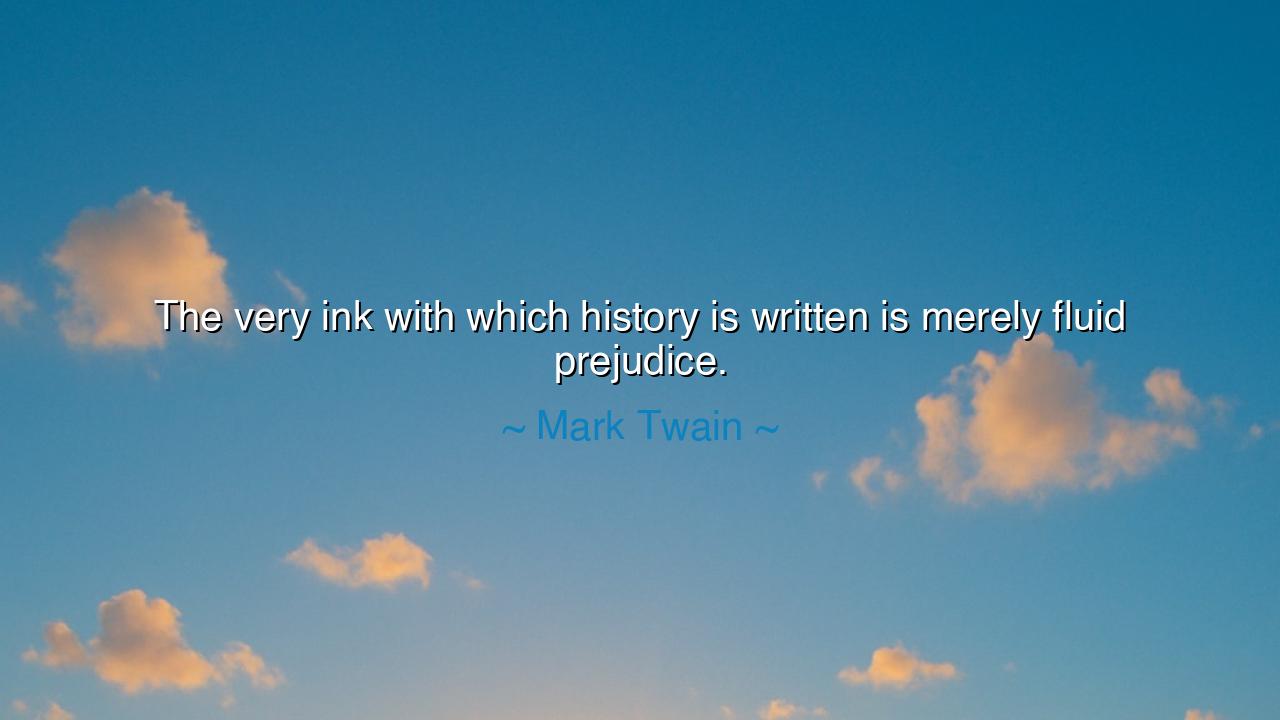
The very ink with which history is written is merely fluid






The great American sage and humorist Mark Twain, who could pierce through the illusions of men with both laughter and lightning, once wrote: “The very ink with which history is written is merely fluid prejudice.” In this single line, Twain delivered a truth that is as unsettling as it is profound — that history, though it pretends to be the record of what was, is too often the echo of bias, power, and partial truth. The ink of history, he tells us, is not pure; it is tainted by the hands that hold the pen. Thus, every chronicle, every monument, every tale that claims to speak for the past must be read with the wisdom of discernment, for beneath its words flow the prejudices of those who wrote them.
To understand the meaning of Twain’s observation, we must first remember the world from which it came. He lived in a time when nations were defining themselves through their histories — each glorifying its heroes, excusing its sins, and burying its contradictions. Twain, a man who saw both the nobility and the hypocrisy of his own country, recognized that truth, when filtered through human ambition, becomes narrative. The victors, not the vanquished, write the books; the powerful, not the powerless, decide what shall be remembered. History, then, is not the unbroken mirror of the past, but a stained glass window — beautiful, perhaps, but colored by the light of the storyteller.
In this truth lies a deep warning. Consider the tale of Christopher Columbus, hailed for centuries as the heroic discoverer of a “new world.” The ink of history, as Twain would say, rendered him a saint of progress — a man of courage and vision. Yet as time unveiled the buried voices of those he conquered, the record grew darker. The same voyages that filled Europe with wonder filled the New World with chains and sorrow. Was Columbus truly a hero, or was he a conqueror cloaked in myth? The answer depends on whose ink writes the story. This is what Twain saw with such clarity — that the facts of history are often less contested than their interpretation, and that the heart of truth is too easily bent by the weight of pride.
The ancients themselves understood this danger. In the courts of kings and emperors, scribes recorded victories but seldom defeats; they exalted the ruler’s virtue but rarely his cruelty. The Egyptians, the Romans, the Chinese dynasties — all carved their histories upon stone and silk to immortalize their glory, not their guilt. Yet truth cannot be erased, only delayed. Every empire that sought to control its narrative was eventually judged by a later age, whose ink flowed from a different well of prejudice. Thus, Twain’s words are not a condemnation of the past alone — they are a mirror held to all time, reminding us that every historian, every writer, every nation must confront the question: Whose truth are we preserving?
And yet, Twain’s tone is not one of despair, but of liberation. For if history is written in fluid prejudice, then it is not fixed — it can be rewritten, re-examined, re-understood. The fluidity of that ink means that truth, though obscured, can still be sought. We, the heirs of all that has been recorded, have the sacred duty to question, to challenge, and to recover the voices that history ignored. The slaves whose songs were never written, the women whose courage was unrecorded, the common people whose hands built the world but whose names were lost — they, too, are part of the great story, waiting for new ink to bring them to light.
To learn from Twain, then, is to become both a reader and a guardian of truth. Do not accept the words of history as sacred merely because they are old; scrutinize them, as a jeweler examines a gem for flaws. Ask who benefited from the story being told, and who was silenced by it. Seek the moral essence beneath the narrative, for there lies the pulse of genuine wisdom. The wise man does not discard history, but refines it — distilling prejudice into understanding, and understanding into compassion.
Therefore, my listener of the future, let Twain’s words dwell within you as a compass of the mind: “The very ink with which history is written is merely fluid prejudice.” Do not allow yourself to be the unthinking inheritor of another’s version of truth. Study deeply, question bravely, and remember that the past, like the present, is made of human hands — fallible, passionate, and ever in search of meaning. Write your own understanding of the world not in the ink of bias, but in the light of honesty. For only when we confront the prejudices of history can we begin to write a new story — one in which truth, at last, is the purest ink of all.






AAdministratorAdministrator
Welcome, honored guests. Please leave a comment, we will respond soon